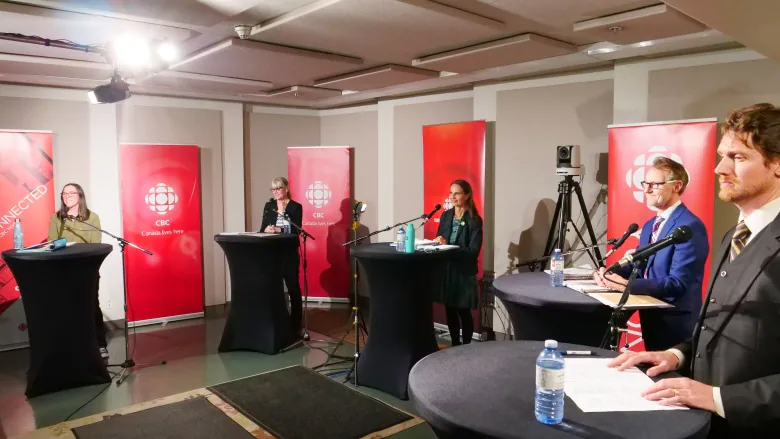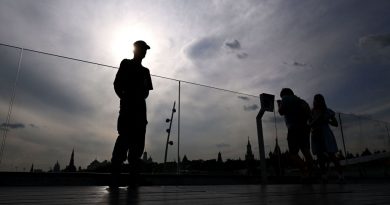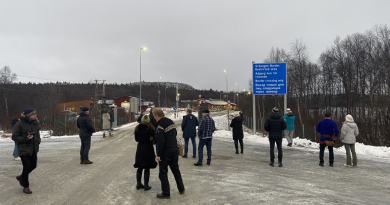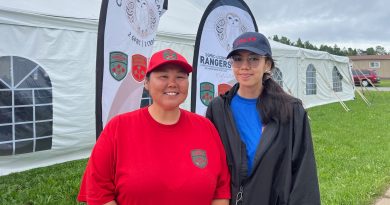Federal candidates tackle mandatory vaccines, housing and gun control at CBC forum in Yukon, Canada

5 federal candidates met Tuesday evening for CBC Yukon’s election forum
Mandatory vaccination was a contentious issue at the all-candidate forum hosted by CBC Yukon on Tuesday evening.
It was one of the few issues candidates clearly disagreed on during a relatively tame forum where all of the candidates would become an MP for the first time if elected.
The event was live streamed online and questions for the candidates came from territorial groups, and emails from the public.
They touched on issues ranging from guaranteed basic income, to food insecurity, to gun control, to reconciliation and electoral reform. Dave White, the host of CBC’s Airplay, moderated the forum, and each candidate was given one minute to answer each question.
Mandatory vaccination
Independent candidate Jonas Smith clearly stood out as the only candidate to publicly oppose current vaccination policies. The former Conservative candidate was recently booted out of his party because of his views on vaccination.
“The reality is there are still thousands and thousands of our family members, our friends, our coworkers or neighbours who have chosen for whatever reason not to get vaccinated, and I believe in those people’s right to choose,” said Smith.
“I am the only candidate of everyone running in this election that respects that choice. Every other candidate or their party supports some form of coercion or discrimination.”
Green party candidate Lenore Morris countered Smith, noting that Canada does not have a vaccine mandate and “nobody is going to grab anyone, wrestle them down and stick a needle in their arm.”
She said she supports vaccine passports, but thinks some of the measures the Liberals are proposing, such as demanding federal public servants get a COVID-19 shot, are very heavy-handed and would like to see more public consultation before they are implemented.
NDP candidate Lisa Vollans-Leduc and Conservative candidate Barbara Dunlop both said they believe everyone who can, should get double vaccinated, and are in favour of a vaccine passport.
Liberal candidate Brendan Hanley began by highlighting the overburdened healthcare system in provinces like Alberta and said that in order to get through this pandemic, “the need is great for higher vaccine levels than we may have thought a few months ago.”
“I think the federal government has shown leadership by taking a strong stance on vaccination,” said Hanley, who is taking leave as Yukon’s chief medical officer during the election campaign.
“Ideally vaccine uptake should always be guided by public health expertise and I look forward to the chance to bring my expertise to the federal table when it comes to implementation.”
Although there was no back-and-forth debate between each participant, moderator Dave White allowed all candidates to follow-up on their answers to this question.
Vollans-Leduc addressed some of Smith’s concerns, saying her party would take into account people who have medical reasons for not getting the vaccine when implementing vaccine policies.
Dunlop took the moment to re-emphasize that “where vaccination is high, COVID is low and hospitalizations are low.”
Hanley noted that the territory ultimately has a say in how vaccine policies are implemented, and said he wants robust vaccine requirements in high risk settings such as healthcare facilities.
Housing, reconciliation and mental health
Housing, reconciliation and mental health were issues all of the candidates agreed were important to address in the territory.
All candidates acknowledged there is not enough housing to accommodate the territory’s growing population, and committed to investing in the construction of more housing, including rental properties.
The Conservatives, Liberals and NDP all have housing plans specifically tailored to Indigenous communities.
Each candidate was asked what reconciliation means to them personally. Vollans-Leduc and Hanley both said the first step towards reconciliation is completing the 94 calls to action made by the Truth and Reconciliation Commission.
Dunlop said reconciliation starts with “respect and understanding,” while Morris said reconciliation will take generations and that we are a long way before making up the legacy of colonial violence.
Smith said he would support an investigation into former residential school sites, and thinks reconciliation is the responsibility of all Canadians.
All candidates agreed the pandemic has exacerbated pre-existing mental health issues in the country, and promised to put funding in place and programs to help.
“We need guns in the Yukon”
White asked all candidates where they stand on the issue of gun control, particularly concerning military-grade assault weapons. The Liberals banned 1,500 types of military-style assault rifles in 2020.
All candidates, except Hanley, agreed that gun control laws should be reformed because they don’t take into account the needs of Yukoners as they stand.
Hanley did however acknowledge that gun control is a polarizing issue and said he would advocate on behalf of Yukoners for new legislation if elected.
Smith was quick to note that Yukon has the highest level of licensed firearms owners in the country, and people living in the territory have been disproportionately affected by the Liberals’ ban.
Vollans-Leduc acknowledged that “we need guns in the Yukon,” saying they’re often tools of everyday life to put food on the table and keep people safe out on the land. She said her party would ensure gun control policies are evidence-based, and not politically motivated.
Morris agreed that gun rules in Canada are coming out of urban areas, and there has not been enough consultation with the North.
“Firearms are clearly viewed differently by Northerners than by people living in southern cities,” stated Dunlop, who said her party would review the firearms classification made by the Liberal government.
Electoral reform
The forum’s final question was submitted by email to the CBC, and asked whether electoral reform is needed now.
For Morris, the answer was a resounding “yes.” She said her party would move toward proportional representation and notes that in the last election, if the Greens would have had six times as many seats with a proportional share of seats.
“It’s not just that the numbers are unfair, it’s that people lose interest if they think their votes don’t matter,” Morris said.
Hanley said he’s been hearing “disappointment that this commitment was not followed through” —referring to the Liberal party’s broken campaign promise from 2015 to drop the first-past-the-post system— but emphasized that 90% of the Liberals’ promises were either partially or completely kept during Justin Trudeau’s first four-year term as prime minister.
Vollans-Leduc both said her party is committed to electoral reform and to lowering the voting age to 16.
Smith, who previously was a strong proponent for the first-past-the-post voting system, said he would consider electoral reform if elected this year.
Related stories from around the North:
Canada: Analysis – The one issue in Canada’s North that all major federal parties agree on, CBC News
Finland: Miners hunting for metals to battery cars threaten Finland’s Sámi reindeer herders’ homeland, The Independent Barents Observer
Greenland: Greenland’s more prominent role on Arctic Council important signal to int’l community says foreign minister, Eye on the Arctic
Norway: The Arctic railway: Building a future or destroying a culture?, Eye on the Arctic
Russia: Indigenous Peoples call on Nornickel’s global partners to demand environmental action, The Independent Barents Observer
United States: Indigenous groups in Alaska welcome Biden’s bid to protect critical Bering Sea area, Radio Canada International



